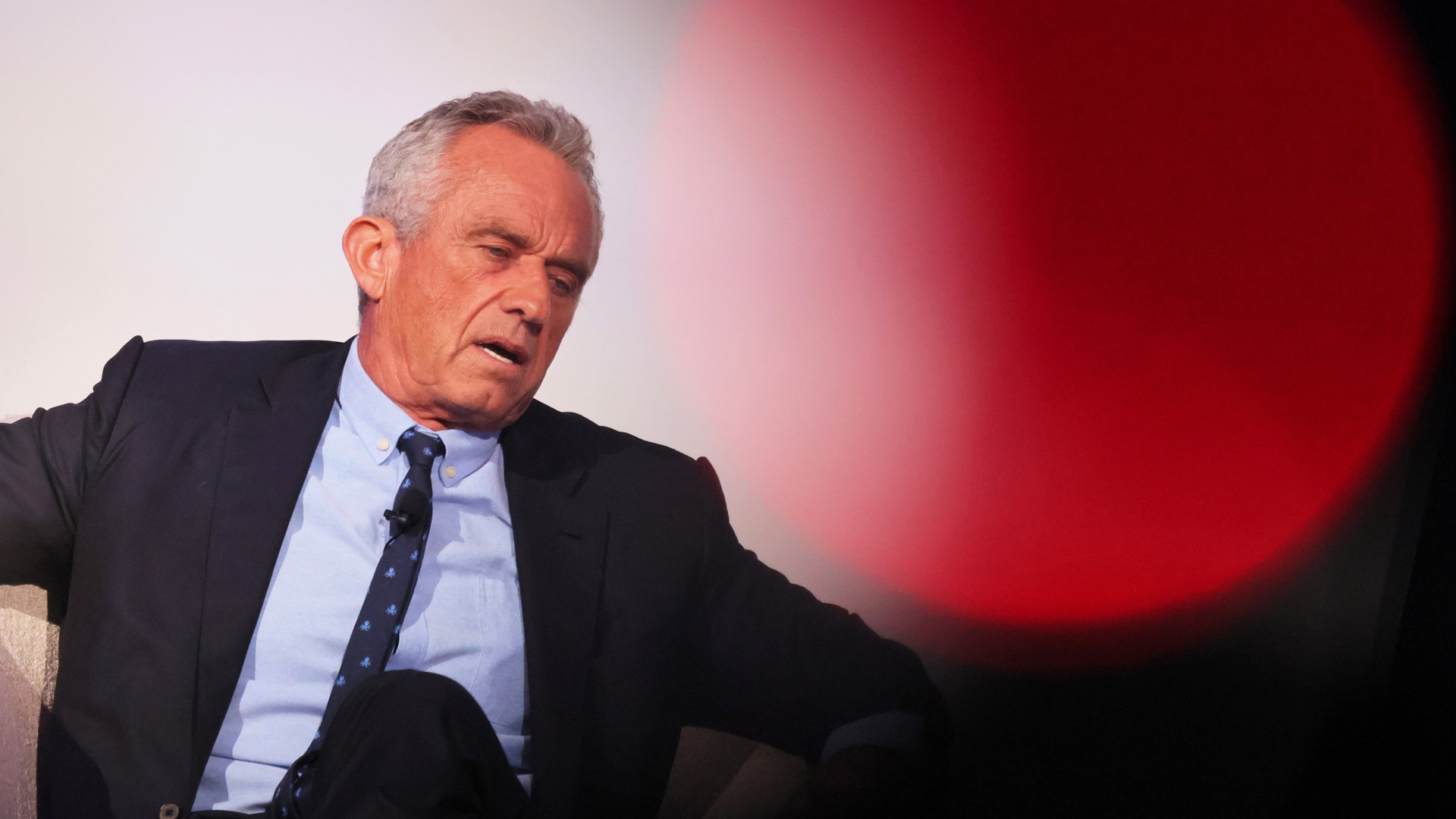There’s not much of a Democratic presidential primary race for 2024. President Joe Biden leads the field with the support of two-thirds of Democratic voters, and the Democratic Party won’t hold any debates. Democrats’ primary voting next spring is likely to be little more than a formality.
But if any declared Democratic candidate has a real chance of unseating Biden, it’s Robert F. Kennedy Jr., who’s polling around 14 percent among Democrats and has brought in a respectable fundraising haul. Curiously, though, Kennedy seems to be finding a core constituency outside his party: He’s increasingly popular on the right, raking in GOP donor cash, being floated as an aisle-crossing cabinet or vice presidential pick, and posting strikingly high favorability ratings with Republican voters.
Statistically, that means RFK Jr. is increasingly popular among white evangelicals too. (He’s certainly popular with my evangelical relatives of the boomer generation.) Part of that may be nothing more than mid-century nostalgia—but, in my observation, nostalgia isn’t the rationale RFK Jr. fans tend to cite.
They like his anti-establishment vibes, his hostility to the same institutional authorities his supporters already distrust. RFK Jr. hails from the most insider family in American politics and he’s closely tied to influential figures in Hollywood. And yet he has successfully cast himself as that most desirable figure in right-of-center politics today: The Outsider, skeptical and freewheeling, ever irreverent toward institutional pieties and dismissive of—as we’d have said in his father’s era—The Man.
But that’s the problem: Anti-establishment vibes aren’t reason enough to support a politician. And if we look past those vibes to policy and personal history alike, Kennedy is a strange bedfellow for evangelicals.
Let’s start with his policies. While he’s presented himself as a victim of and champion against censorship, Kennedy is far from a First Amendment purist. As Reason’s Matt Welch has documented in a rundown of RFK Jr.’s more authoritarian tendencies, Kennedy has called for criminal consequences for those who dare to disagree with him on climate change.
In 2014, for example, he said the Koch brothers (industrialists and major political donors, generally to libertarian and Republican causes) “should be in jail … enjoying three hots and a cot at The Hague.” Politicians who share their climate views, he added, are “contemptible human beings,” and there ought to be “a law that you can punish them under” for their global warming wrong-think.
A month later, Kennedy penned an article calling for an “attorney general with particularly potent glands [to] revoke the charters” of center-right think tanks AEI and CEI—by which he meant that they and other conservative nonprofits should be forcibly shuttered by the federal government for their beliefs.
Then there’s abortion. While evangelicals remain significantly more pro-life than the public at-large, Kennedy has abandoned older pro-life convictions to declare himself pro-choice. “I don’t think there’s anyone in this country who has worked harder for medical freedom, for bodily autonomy, than me,” he told New Hampshire voters this summer. He’s unwilling, he said, to let the government tell “a woman to bring a child to term that she doesn’t want.” Though he allowed that abortions are tragic, and that third-trimester abortions should be ended “in other ways,” Kennedy was clear that banning abortion was the “worst solution” for “decisions that should belong to a woman.”
Beyond these and other policy differences, RFK Jr.’s personal life deserves a mention too. Though Catholic, his comments on God and Christian theology are confused. He has leveled the “great books of [organized] religions” as equal moral authorities and described conversion as a process of imagining God as a perpetual hall monitor. He’s also named creation, not Jesus (Col. 1:15–20), as God’s greatest revelation. And, in an echo of former president Donald Trump’s infamous biography, Kennedy, too, is thrice married, a detail that once would’ve mattered in evangelicals’ political decisions.
What seems to matter instead—perhaps supremely—for many RFK Jr. supporters is his anti-establishment bent, and the appeal of Kennedy’s posture of suspicion is easy enough to understand. Skepticism of authority is perhaps the deepest American political instinct. Though expressed differently across ideological lines, it’s ever-present and often a very healthy habit of mind: A willingness to scrutinize the pronouncements of power is necessary for good self-government.
And if this cynicism has become overgrown in the last few years, well, that’s understandable too. American trust in institutions and experts was already in decline, and mishandling of pandemic policy may have given it a permanently low ceiling. Two years of noble lies, official hypocrisy, and politics repackaged as capital-S Science did real damage to many Americans’ inclination to give authorities the benefit of the doubt.
Still, “understandable” is not the same as “right.” We can and should maintain a healthy skepticism of concentrated power, but that doesn’t mean spreading a blanket cynicism toward institutional authorities or a reflexive doubt of real expertise.
We constantly rely on experts to keep our complex society reasonably functional, and many of the social troubles we all bemoan—loneliness, alienation, political violence and fragmentation—are linked to the breakdown of communal institutional life, including the life of the church.
Authority can undoubtedly be a dangerous thing, but it is not an inherently bad thing. Scripture repeatedly calls Christians to submit to authority (e.g., Rom. 13:1–7, 1 Pet. 2:13)—whenever doing so does not conflict with God’s higher commands (Acts 5:29, Rom. 13:8–10)—and, like many tools, authority can be wielded for both good and ill.
But forming political alliances on anti-establishment vibes alone doesn’t make that crucial distinction. It has ample energy for tearing down, but little thought for what we might rebuild. And after an unsettled political decade, we should be wary of taking up whatever sledgehammer comes to hand.
Bonnie Kristian is editorial director of ideas and books at Christianity Today.











